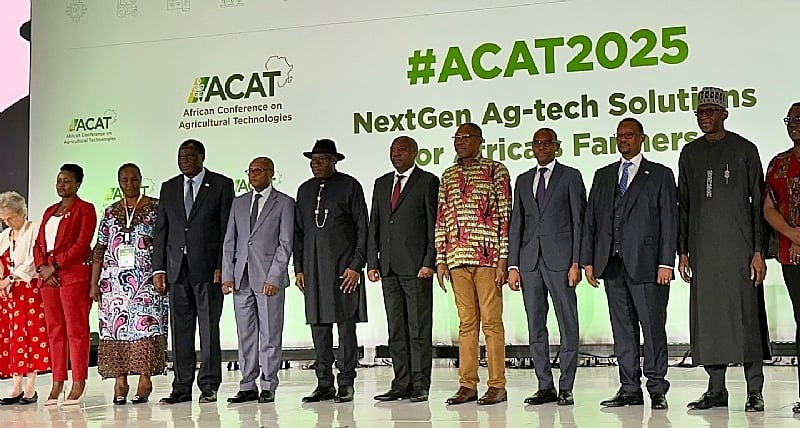The African Agricultural Technologies (ACAT) conference, held at the Kigali Convention Centre in Rwanda, served as a crucial platform for stakeholders across the African continent and beyond to converge and deliberate on the future of agriculture in Africa. The conference, themed around technology, sustainability, and youth empowerment, aimed to chart a course towards accelerating agricultural transformation and bolstering food security across the continent. Ghana’s participation, represented by Deputy Minister for Education, Dr. Clement Apaak, underscored the nation’s commitment to regional collaboration in addressing the critical challenges and opportunities within the agricultural sector. The presence of other dignitaries, including former Nigerian President, H.E. Dr. Goodluck Ebele Jonathan, and the Rwandan Prime Minister, Dr. Édouard Ngirente, further emphasized the significance of the event and the collective recognition of agriculture as a cornerstone of African development.
Dr. Goodluck Jonathan’s keynote address resonated powerfully with the conference’s core theme, highlighting the indispensable role of sustained investment in driving Africa’s agricultural transformation. He argued that consistent and strategic financial commitment is not merely a desirable option but a fundamental necessity for unlocking the vast potential of the agricultural sector. This investment, he emphasized, should encompass not only technological advancements but also crucial areas such as infrastructure development, research and development, capacity building, and market access, all of which are essential for creating a resilient and prosperous agricultural landscape. His address served as a clarion call for governments, private sector actors, and international development partners to prioritize and amplify their investments in African agriculture.
The official opening ceremony, presided over by Rwandan Prime Minister Dr. Édouard Ngirente, marked the commencement of a series of engagements designed to foster collaboration and knowledge sharing among participants. The presence of Ambassador Ibrahim Zanna, the Acting High Commissioner, further highlighted the diplomatic significance of the event and the importance of inter-governmental cooperation in achieving shared agricultural goals. The diverse range of attendees, encompassing policymakers, researchers, farmers, and innovators, created a rich tapestry of perspectives, fostering a dynamic environment for productive dialogue and the exchange of best practices.
Dr. Clement Apaak’s active participation in the conference extended beyond ceremonial attendance. He engaged in substantive discussions focused on enhancing Africa’s food systems, contributing Ghana’s insights and experiences to the broader continental conversation. His involvement underscored the importance of cross-sectoral collaboration, recognizing the interconnectedness of education and agriculture in achieving sustainable development goals. By sharing Ghana’s unique perspectives and learning from the experiences of other nations, Dr. Apaak contributed to the collective effort of shaping effective strategies for improving food security and promoting agricultural advancement across Africa.
ACAT 2025 provided a vital platform for showcasing innovative agricultural technologies and exploring their potential to revolutionize farming practices across the continent. From precision agriculture and data-driven solutions to climate-smart agriculture and biotechnology, the conference offered a glimpse into the future of farming in Africa. The emphasis on technology underscored the transformative power of innovation in addressing challenges related to productivity, efficiency, and resilience in the face of climate change. The conference also highlighted the importance of ensuring equitable access to these technologies, particularly for smallholder farmers who constitute the backbone of African agriculture.
The theme of youth empowerment resonated strongly throughout the conference, recognizing the crucial role of young people in driving agricultural transformation. Engaging youth in agriculture is not only essential for ensuring the sector’s future viability but also for addressing broader socio-economic challenges such as unemployment and rural poverty. ACAT 2025 fostered a dialogue on strategies for attracting and retaining young talent in agriculture, including promoting entrepreneurship, providing access to training and resources, and creating an enabling environment for youth-led agribusinesses. The conference served as a powerful reminder that investing in youth is investing in the future of African agriculture. The discussions, presentations, and networking opportunities provided at ACAT 2025 are expected to catalyze concrete actions towards a more sustainable, resilient, and prosperous agricultural sector in Africa, contributing significantly to the continent’s overall development agenda.


